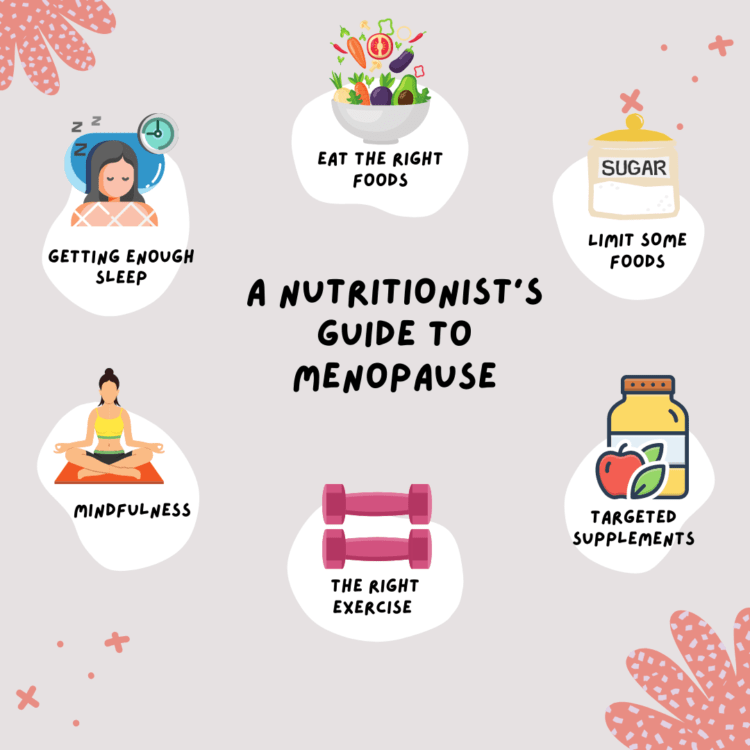My nutrition and lifestyle approach to peri/menopause is not just about a list of foods you may benefit from eating.
And it is not a diet…
It is a way of eating for the long-term to help minimise your symptoms, as well as protect your long-term health
A way of eating that could support you in feeling your best with more energy, mental clarity, better moods and improved sleep quality.
It could also help you to manage your weight and body fat.
This way of eating is about variety and abundance and not restriction
It’s about the proportions of foods that you eat and when you eat them
And it can also be about understanding your own personal needs (Functional testing) and using this information to give your body what it may be missing or needs to function optimally.
Perimenopause and Menopause
There are many changes happening to your body in the lead up to menopause (which is actually just 1 day = exactly 1 year after your last menstrual period)
The years prior to menopause, when your hormones will be changing, is the time when you are likely to experience the most symptoms. This is called perimenopause
To help your body to adapt to these changes and to manage symptoms as effectively as possible, you may also need to make some adjustments to the way your lifestyle and the way you eat and drink
Foods to Enjoy
We are all unique, so this is about the right foods for you.
However, for most people, eating a rainbow of colourful vegetables can provide many of the essential nutrients your body needs. Combining this with some quality protein sources and some healthy fats are, in my opinion, the foundations of healthy eating in peri/menopause and beyond
Foods to Limit or Avoid
Like it or not, there are also some types of foods that your body will find harder to cope with once your hormones start changing. Foods and drinks that have high sugar content, or foods that are quickly turned to sugar in the body, such as bread, pasta and (sorry) alcohol are best limited or even avoided.
This may sound like a big deal but honestly, there are so many options to satisfy a sweet tooth or drinks to enjoy instead of alcohol, that you may not miss them at all. AND you are likely to feel so much better for it
Targeted supplements
My approach is always food first but sometimes we may need to give our body a bit of a helping hand… Short-term targeted supplements that support specific systems and processes within your body and others that may have more general benefits (multi-vitamin and mineral complexes, fish oils), may help to push the needle back to your feeling your best box.
The right type of exercise FOR YOU
There is no one size fits all approach to exercise, especially for women in midlife. Some women can cope with high-intensity exercise at this life stage and some women can’t with stress hormones being activated too quickly and often.
However, women start to lose muscle mass quite quickly during midlife. Muscle mass is essential to support balance, frailty, physical function and metabolism and this is why most women benefit from resistance/weight training
Managing stress
Stress can come from many sources including emotional stress, overexercising, poor sleep, a poor-quality diet, food sensitivities, undereating, blood sugar imbalances, a gut imbalance, pain and inflammation etc
Your body cannot differentiate and all of these issues can increase the stress hormones.
Consistently high levels of stress hormones can impact many areas of your health including your sleep, your energy levels, your weight, your moods…
Managing what is in your control (food, exercise) and developing habits to manage how you build stress resilience and manage the rest can be an essential part of health and wellness.
Yoga, T’ai chi, meditation, journaling, walking in nature, breathwork are just some of the practices you can try
Supporting good quality sleep
Sleep disturbances are commonly reported among peri-menopausal and menopausal women. If you are finding it hard to get to sleep or stay asleep, this could be affecting your health…
Poor quality sleep can impact your mood and your feelings of overall well-being. It can cause you to make poor food choices, affect hunger hormones, your energy levels, your body’s detoxification processes and prevent you from being active. It can also affect your weight. You can find out more about menopause and weight gain here.
Nutrition for peri/menopause requires a 360-degree holistic approach because how you feel is everything!
If you would like to find out how this could work for you, click here to book a complimentary call




